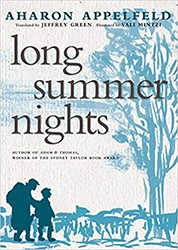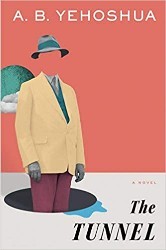What is so remarkable about To The Edge of Sorrow by Aharon Appelfeld is that it appears to be a story about Nazi freedom fighter, told very simply by a seventeen-year-old member of the forty-seven-man group. But it really provides a blueprint for the means of achieving happiness under unbearable conditions.
Amid the damp, freezing mountains on which they are camped, these escapees from their ghettos manage to organize a way of life based on their past learning and memories of home to keep up their inspiration in order to rescue all the Jews on transports that they can. In the evening, they gather together to listen to a Hasidic member of the group sing the songs he remembers his grandfather used to sing.
Kamil, the leader, decides to lead learning sessions of the Torah in the Hebrew language. Each day, a new Hebrew word is learned and used as a password. An elderly, blind member makes himself useful by knitting caps that cover their ears, and socks and vests to help keep them warm enough so that they do not freeze to death during their missions.
Grandma Tsirl, one of the few women in the group, creates flavorful meals out of the few supplies they have. She also hands out wise words of encouragement.
One time, they raid a house emptied of the Jews who used to live there, and find a trove of books, which they see as a treasure that enriches their souls. Reading the classic writers prevents them from falling into despair, for to them, “Despair is not a quality worth having.” They do not even have despair about the young, mute boy, Millio, whom they have taken with them and whom one member, Danzig, becomes very attached to, positive that he will speak one day. He is rewarded for this belief in a very poignant scene.
In the midst of all the action, the young narrator keeps remembering his former life with parents who wanted only one thing from their only son — his happiness.
That is why when they are waiting to be transported to the concentration camp, they urge him to run away from them and leave the train station. He listened and has never forgiven himself for doing so. He is tortured by memories of his mother walking him to school in first grade, when other boys went alone, the luxurious vacations to hotels with his parents, and their other kindnesses to him. Atonement seems unattainable to him until Grandma Tsirl reminds him that giving charity is one of the means of gaining atonement and he is doing that every day that he fights for the freedom and life of every Jew he can find. This mollifies him and he even becomes more charitable in his judgments of the other members of the group as a result.
When they blow up part of one transport and rescue many starving and weak women and children with “eyes swollen and legs wobbling,” which they find hideous to look at, Kamil reminds them of a lesson important for all of us: “to see only the human suffering and not its ugliness…ugliness is only the exterior of suffering; a soul resides within everyone who suffers.”
This book is really a tutorial on how to successfully survive the trauma resulting from unwarranted cruelty and avoid permanent depression. That is the cleverly hidden lesson underlying this intriguing story of the small group of men and women courageously fighting Nazi terror.





